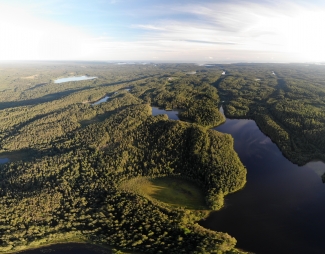Russian forests and climate change

A newly published report on Russian forests and climate change aims to show how the forest sector can help the Russian Federation to meet its Paris Agreement targets and, at the same time, how the sector can contribute to improve the economy. This is linked to building an innovative strategy of sustainable forest management, addressing conservation as well as productivity, emphasizing the country’s aims of low carbon society, boosting the investment sector on forest products and introducing technical innovation measures of the bioeconomy, as represented by new and emerging wood-based products.
The international team of authors, led by Prof Pekka Leskinen from EFI, provides a systematic analysis of the Russian Federation’s forest resources; their potential for carbon sequestration and contribution to the Paris Agreement targets; the impacts of climate change; and the risks associated with biotic and abiotic disturbances. In addition, they present three regional case studies with varying degrees of opportunities and solutions for protecting forest resources and enhancing ecosystem services both for carbon sequestration and for wood-based products, using the framework of Climate Smart Forestry (CSF). They also look at the climate change mitigation potential and opportunities arising from forest bioeconomy and the transformation of Russia towards a low carbon society including various innovative solutions for new wood-based products and industrial sectors.
The authors conclude that currently, Russian forests represent a large carbon sink, but there are also large areas in the Northern and Eastern parts of Russia, which act as a carbon source. These areas are typically located either on permafrost or in disturbed forests. However, the several years of large wildfire disturbances with subsequently increased tree mortality may lead to substantial decrease of the Russian forest carbon sink. Future natural disturbance impacts are critical: attention should be paid to preventing of disturbances and enhancing forest restoration/reforestation. Climate change impacts will put the current forest sector severely at risk. The potential to reach the Paris Agreement targets through a significant contribution of the bioeconomy cannot be achieved without active forest management with a strong focus on natural disturbance prevention and enhancing forest resilience.
Investments in sustainable and climate-smart forest management are needed and should be aimed at long-term goals rather than short-term lease contracts, as well as to improved infrastructure especially in the accessible forests. Without active, climate-smart forest management, the potential of bioeconomy cannot be achieved. In other words, investing in bioeconomy would enable funding for improved forest management and infrastructure, which could further lead also to protecting biodiversity and ecosystem services. Successful development of bioeconomy markets linked with circular economy can create a new economic foundation instead linear economy based on fossil materials – here such emerging sectors of bioeconomy as using wood in construction, textiles, and biofuels production could be considered.
The report is available for a free download: https://doi.org/10.36333/wsctu11
The Executive summary available in English or in Russian.
Full citation: Leskinen, P., Lindner, M., Verkerk, P.J., Nabuurs, G.J., Van Brusselen, J., Kulikova, E., Hassegawa, M. and Lerink, B. (eds.). 2020. Russian forests and climate change. What Science Can Tell Us 11. European Forest Institute. https://doi.org/10.36333/wsctu11
More information: Pekka Leskinen, Head of Bioeconomy Programme, EFI, firstname.lastname@efi.int
Photo: ©Lunatishe - stock.adobe.com


